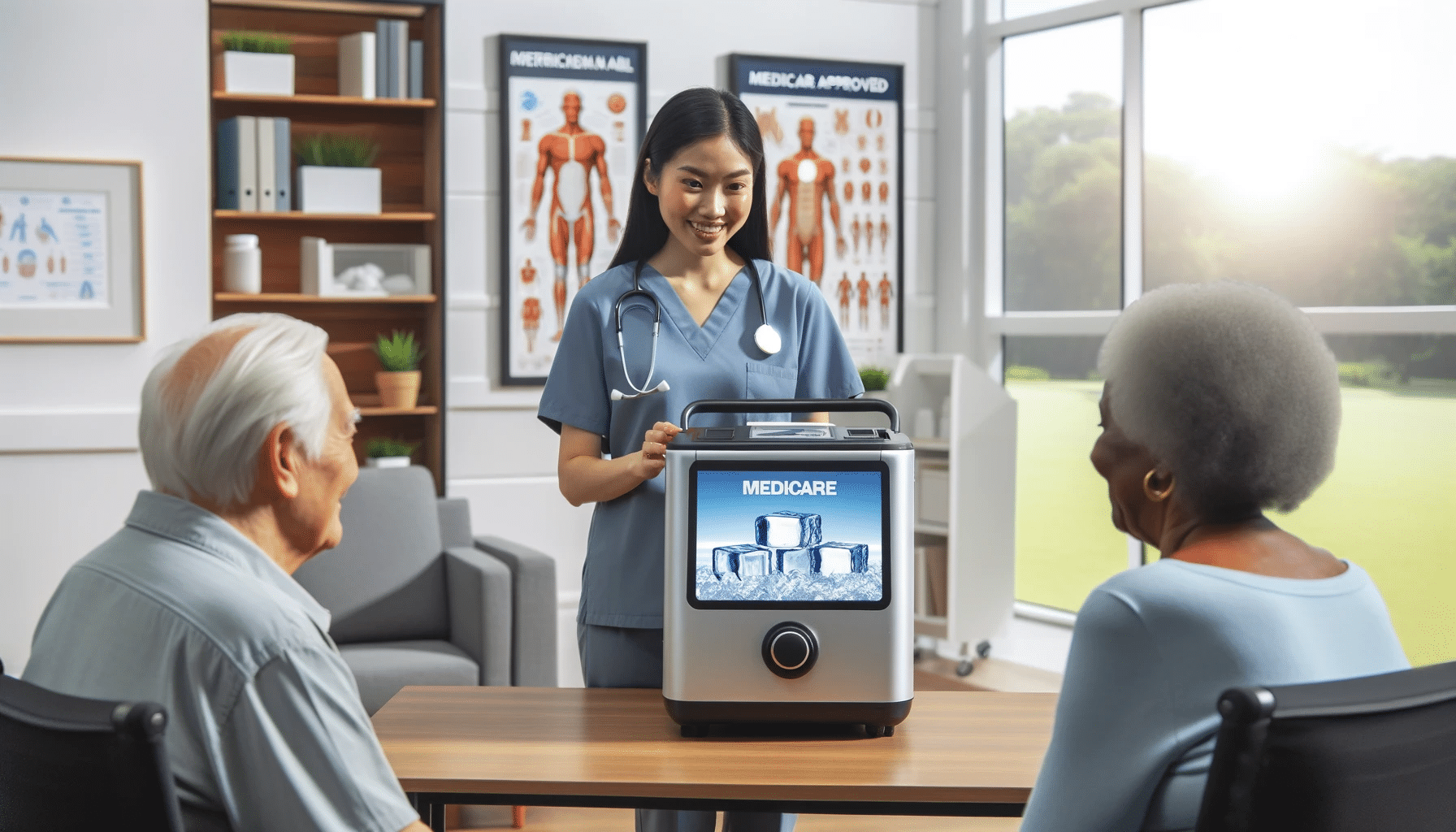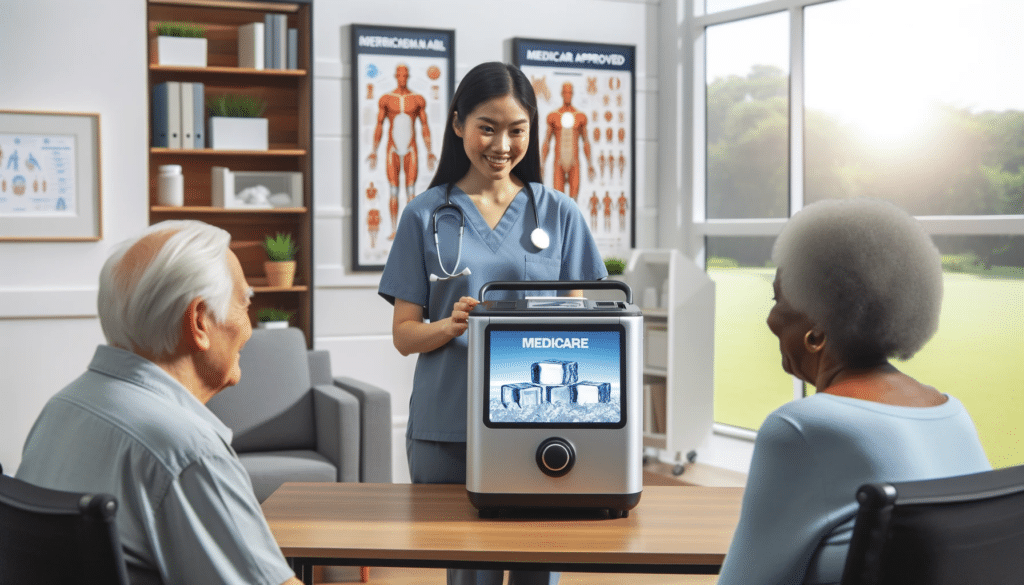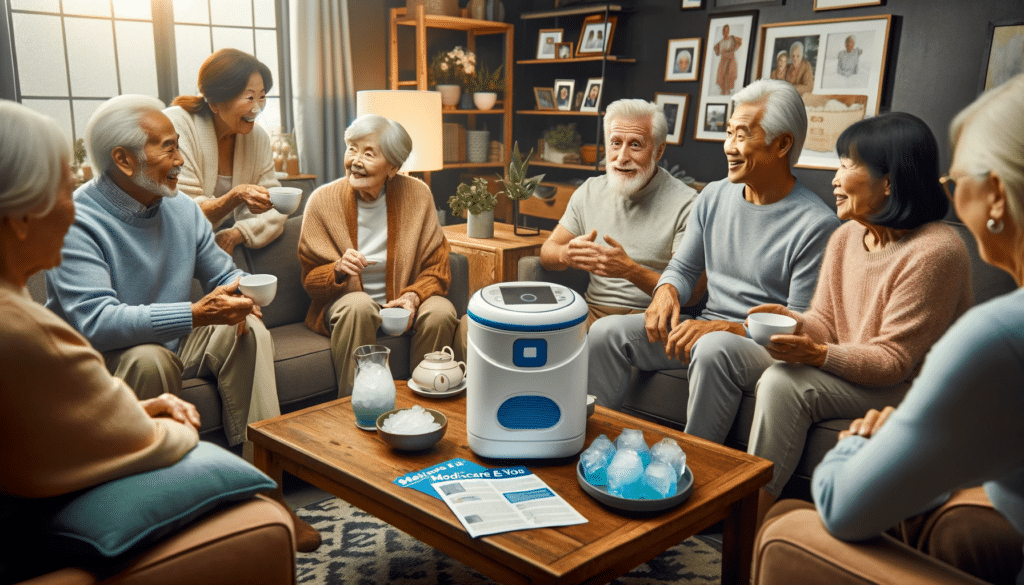Call to speak to a Licensed Insurance Agent
Mon - Fri 8am – 8pm EST; Sat - Sun 10am - 6pm EST

No, Medicare usually doesn’t cover the cost of ice machines. But there are exceptions to the rule that could work in your favor. Keep reading to find out the specific situations where Medicare might foot the bill for your ice therapy machine.
Wondering when Medicare will help you buy an ice machine for your aches, pains, or post-surgery care? We’ve got the scoop here as well as other options you may consider.

Keep reading to get detailed information on:
This guide is jam-packed with everything you need to know about ice machines and Medicare, so don’t miss out!
You can find a lot more information on the treatments, services and conditions Medicare covers in our article, What Does Medicare Cover?
The short answer is no. In most cases, Medicare will not cover the cost of ice machines.
That said, there may be some situations where you can get these costs covered. Below we’ll take a closer look at this to see when you might be able to get Medicare to pay for your ice therapy machine.
Original Medicare may provide coverage for hot and cold therapies on an inpatient and outpatient basis. Unfortunately, ice machines are not one of the covered therapy options.

Original Medicare (Medicare Part A and Part B) does not provide coverage for ice therapy machines for home use. Despite their helpful nature, they are considered comfort items and not Durable Medical Equipment (DME). DME is covered by Medicare Part B.
To have a chance of getting Medicare coverage for an ice machine, your healthcare provider must make the case that the machine is medically necessary.
If you have a Medicare Advantage plan, it’s possible your plan will provide coverage for an ice machine. You’ll want to check with your plan provider to see if you can get coverage/reimbursement.
You can find ice therapy machines at many online retail sites. They usually cost between $130 to $220.
If you’re hoping Medicare will help pay for an ice machine, here’s what you need to know. Medicare Part B can sometimes cover ice machines as durable medical equipment, but it’s not guaranteed.

To have a chance to get coverage, your doctor has to write a prescription and say why you really need it. If you get approval, you’ll still have to pay a deductible along with 20% of the machine’s cost.
If Medicare doesn’t help, you have other choices. You can pay for it yourself or look into Medigap plans that can help with the costs. Different Medicare Advantage plans might also offer coverage, so it’s worth checking.
While Medicare doesn’t usually cover ice machines, exceptions exist for conditions that require cold therapy, like frostbite or burns.
To get coverage, you’ll need a prescription from your doctor stating the medical necessity of the ice machine for your specific condition.
Here’s a guide on how to approach this:
If you’re denied coverage, you have the option to appeal. More information on appeals is available on the Medicare website.
The prescription from your doctor should clearly state that the ice machine is medically necessary for treating your condition. It needs to be signed and dated.
Medical necessity is crucial for coverage. Conditions that could deem an ice machine as medically necessary include frostbite, burns, and specific joint disorders.
The process for pre-authorization may differ depending on your Medicare carrier. You’ll likely need to provide your prescription and documentation, and you may be asked additional questions about your condition.
If you have questions or run into issues, Medicare representatives are available to assist you. Choose a supplier that is Medicare-approved. You can verify their approval status by asking for their Medicare supplier number or by checking with your Medicare carrier.
Cold therapy is a simple way to relieve pain and swelling from things like sports injuries, headaches, or after surgery.
It works by making blood vessels smaller, which slows down blood flow to the hurt area. This helps lower swelling and also numbs the area to reduce pain.
Cold therapy is used for many health issues including muscle pulls, back pain, and arthritis. Even people with conditions like fibromyalgia find it helpful.
It’s an old remedy, but today we have more options, like ice machines, that are easier and cleaner to use than traditional ice packs.
New gadgets have made cold therapy even better. For instance, special chambers use extreme cold to offer benefits like less pain and better athletic performance.
There are also tools that use cold air for massaging sore spots, helping to lessen pain and improve blood flow. These advancements mean cold therapy will likely continue to improve and help us in new ways.
Ice machines are used for cold therapy, a treatment that helps reduce pain, swelling, and inflammation. These machines cool water and turn it into ice, which can be stored or go straight into a container for use.
Here’s how an ice machine works step-by-step:
The machine makes sure the ice is cooled evenly thanks to the circulation of water. A thermostat, which is like a temperature watcher, decides when the machine needs to start cooling the water again.
Compared to old methods like using ice packs, ice machines are more convenient and efficient. They also can make a lot of ice, which is helpful if you need a lot of cold therapy. Research shows that ice machines are good at reducing pain, swelling, and inflammation.
A cold compress may be a good alternative if you can’t get an ice machine. A cold compress is a form of treatment for severe pain and swelling through the use of ice packs or frozen materials. People use a cold compress to treat injury, pain, fever, and swollen parts of the body.

Even though you can buy products or machines that can provide cold compress/therapy, you can also create your own “Do It Yourself” cold compress at home.
Of course, you are going to need several items to create a cold compress. So here are the things you may need to create your own cold compress:
Here are the procedures you must follow to make your cold compress. There are two ways to create them, and here is how you do the first procedure:
Now here is the second procedure:
Now you know the ins and outs of Medicare coverage for ice therapy machines.
Just to recap: Medicare usually won’t cover the cost, but don’t lose hope. There are specific situations and alternative plans like Medicare Advantage that might help you out.
Why does this all matter? Well, if you’re recovering from surgery or managing chronic pain, an ice machine can be a real game-changer for your comfort and recovery.
What’s the next step for you? If you think an ice machine could genuinely benefit your health, it’s worth a chat with your doctor to get the necessary prescription and paperwork. And don’t forget to double-check your plan specifics if you have Medicare Advantage or a Medigap plan.
Whether you need a prescription for an ice machine depends on two things: the kind of machine and your health needs. Simple ice machines for home use don’t need a doctor’s note. But, medical-grade ice machines do need one. These can include machines for serious cold treatments, wound care, or special oxygen therapies.
Ice therapy reduces knee surgery pain and edema. Doctors recommend icing your knee for 24–48 hours. Ice machine treatments last 20–30 minutes, many times a day.
Avoid frostbite by placing a towel between your skin and the ice. After two days, you can use it less, but how long you need it depends on your healing.
Medicare usually doesn’t pay for ice therapy machines. But sometimes there are exceptions. If you really need one for medical reasons, you might get lucky and have it covered. We discussed those special cases above.
Medicare usually doesn’t pay for ice machine rentals. But if your doctor says it’s a must-have for a medical condition, like trouble swallowing, you might get covered.
You’ll need a doctor’s note saying it’s needed for your health issue. Once approved, Medicare may pay for the rental up to 12 months, sometimes longer.
If Medicare won’t cover an ice machine, they may cover other solutions like ice packs, cold compresses, chemical cold packs, and cold therapy wraps. Drugstores and medical shops sell them. Medicare will help if a doctor says you need them. You’ll likely pay a little portion.
Note: Medicare coverage changes all the time. And your specific coverage may vary from plan to plan for Medicare Advantage and Medigap plans. Always be sure to double check with your health care provider and/or Medicare insurance provider about what your plan covers and what it does not.
Also, you can check out other articles in this series including, does Medicare cover Armour Thyroid and Medicare coverage for Nucala.